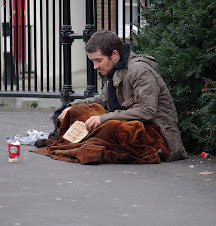There is good money and bad money spent on people in need.
Here is an example:
A guy is living on a front-room couch in a friend’s apartment. This is a person who can be considered “precariously housed.” He is under some pressure from his friend to hurry up and find a place of his own.
The guy has already been to the homeless shelter, and he doesn’t want anything to do with the weird ways by which this particular shelter is directed. He makes a rare find: an apartment that is available. The property manager has agreed to hold it for him for just a few days.
The problem is, to get in, he has to come up with $135 up front. He won’t get paid for 8-10 days. This is a pretty typical situation for anyone looking for a place. He is $135 away from a missed opportunity, with darn few other options.
This particular $135 is “good money.” That is, this money is going to perform well. It is going to bring a young man out of homelessness, and into an apartment so he can gain some ground and get his life settled down.
I consulted a pastor about helping me get some money to this guy. The pastor said that his church does not help people with rent. In other words, if I come up short during the month, I can’t go to this church to help me make rent. Different churches and outreach groups have different means whereby they serve the community. It will be a project of mine to try to put these together so I can match the need to the appropriate helping agency.
At any rate, I gave the pastor my “good money” speech, and he liked it. So, the guy got his apartment.
Another example: A friend who doesn’t have two nickels to rub together is lacking $40 for a physician’s physical as a requirement to get into an effective alcohol treatment program. That $40 is good money.
Other examples: The cost of a set of work clothes for someone’s new job is good money. The cost of sending a wayward kid home to his parents in the South is good money. The cost of the fee for a new birth certificate that got lost or stolen is good money. Circumstances many times place different values on money. Sometimes ten bucks is just ten bucks. Other times, it could be the difference between making or breaking someone.
Friday, February 15, 2008
Subscribe to:
Post Comments (Atom)



No comments:
Post a Comment